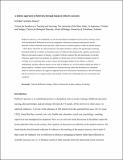Files in this item
A holistic approach to fieldwork through balanced reflective practice
Item metadata
| dc.contributor.author | Blair, E. | |
| dc.contributor.author | Deacon, A. | |
| dc.date.accessioned | 2016-12-23T00:32:21Z | |
| dc.date.available | 2016-12-23T00:32:21Z | |
| dc.date.issued | 2015-06-22 | |
| dc.identifier | 204850129 | |
| dc.identifier | 5f1467bb-db62-474f-a8c4-6befa7eda176 | |
| dc.identifier | 84934434500 | |
| dc.identifier | 000357020500009 | |
| dc.identifier.citation | Blair , E & Deacon , A 2015 , ' A holistic approach to fieldwork through balanced reflective practice ' , Reflective Practice , vol. 16 , no. 3 , pp. 418-434 . https://doi.org/10.1080/14623943.2015.1052388 | en |
| dc.identifier.issn | 1462-3943 | |
| dc.identifier.uri | https://hdl.handle.net/10023/10009 | |
| dc.description.abstract | Reflective practice is well-established as a tool for practitioner development in areas such as nursing, social work and education. Reflection involves the integration of theoretical constructs and practical action; therefore it seems somewhat ironic that there is little written on reflective practice within the natural sciences – where theory and action are often juxtaposed. This paper attempts to address this gap through examining biological fieldwork in relation to a balanced system of reflection that embraces the cognitive, psychomotor, affective and conative aspects of practice. A model of reflective practice that asks practitioners to log their reflections against these four domains was applied to a biodiversity survey of tropical mountain streams in Trinidad. It was found that there is clear evidence that biological fieldwork can embrace a reflective methodology and that reflective practice can be used in fieldwork as a tool for making explicit that which is already implicit. A holistic vision of fieldwork is sketched out here, where the introduction of a balanced model of reflective practice can support an approach that moves beyond the consideration of the environment and the researcher as two separate entities and, instead, considers the relationship between environment and researcher. | |
| dc.format.extent | 17 | |
| dc.format.extent | 764412 | |
| dc.language.iso | eng | |
| dc.relation.ispartof | Reflective Practice | en |
| dc.subject | Vitruvian Reflection | en |
| dc.subject | Biology | en |
| dc.subject | Reflective framework | en |
| dc.subject | Holistic | en |
| dc.subject | Domains of learning | en |
| dc.subject | GE Environmental Sciences | en |
| dc.subject | L Education (General) | en |
| dc.subject | QH301 Biology | en |
| dc.subject.lcc | GE | en |
| dc.subject.lcc | L1 | en |
| dc.subject.lcc | QH301 | en |
| dc.title | A holistic approach to fieldwork through balanced reflective practice | en |
| dc.type | Journal article | en |
| dc.contributor.sponsor | European Research Council | en |
| dc.contributor.institution | University of St Andrews. School of Biology | en |
| dc.contributor.institution | University of St Andrews. Fish Behaviour and Biodiversity Research Group | en |
| dc.identifier.doi | 10.1080/14623943.2015.1052388 | |
| dc.description.status | Peer reviewed | en |
| dc.date.embargoedUntil | 2016-12-22 | |
| dc.identifier.url | http://www.tandfonline.com/doi/abs/10.1080/14623943.2015.1052388#.VmH64F7SfWk | en |
| dc.identifier.grantnumber | 250189 | en |
This item appears in the following Collection(s)
Items in the St Andrews Research Repository are protected by copyright, with all rights reserved, unless otherwise indicated.

